Tennessee is known for the Great Smoky Mountains, the Grand Ole Opry, and some of Country Singer’s biggest stars. You can also find some of the best fried catfish, biscuits and gravy, and Memphis barbeque. The state animal is the raccoon found throughout the state, and the official commercial fish is the catfish. Are catfish dangerous? What about other poisonous or venomous animals? Are there any bears in Tennessee? Did you know Elvis had a large variety of animals at Graceland, including a few donkeys that lived in his empty swimming pool for a bit? Are there still animals at Graceland, and are any of them dangerous? Let’s find out about some of the most dangerous animals in Tennessee.
How Are Catfish Dangerous Animals In Tennessee?
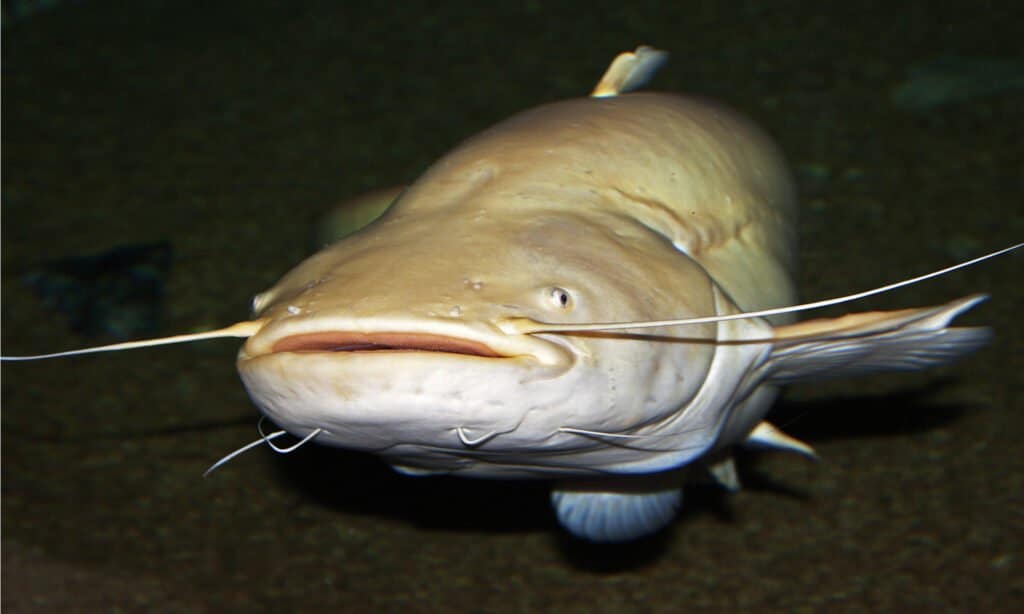
Blue catfish
are usually 2 feet long, but some can get as big as 5 feet!
©Bildagentur Zoonar GmbH/Shutterstock.com
Catfish can be found on many commercial farms and in the wild in the Tennessee, Mississippi, and Cumberland Rivers. They can be dangerous because they have spines on their dorsal and pectoral fins that contain venom that can cause pain and inflammation. Although these fish are large, they do not aggressively attack people, so they are not the most dangerous animals in Tennessee. So, what animals in Tennessee are dangerous?
What Animals Are Venomous Or Poisonous In Tennessee?
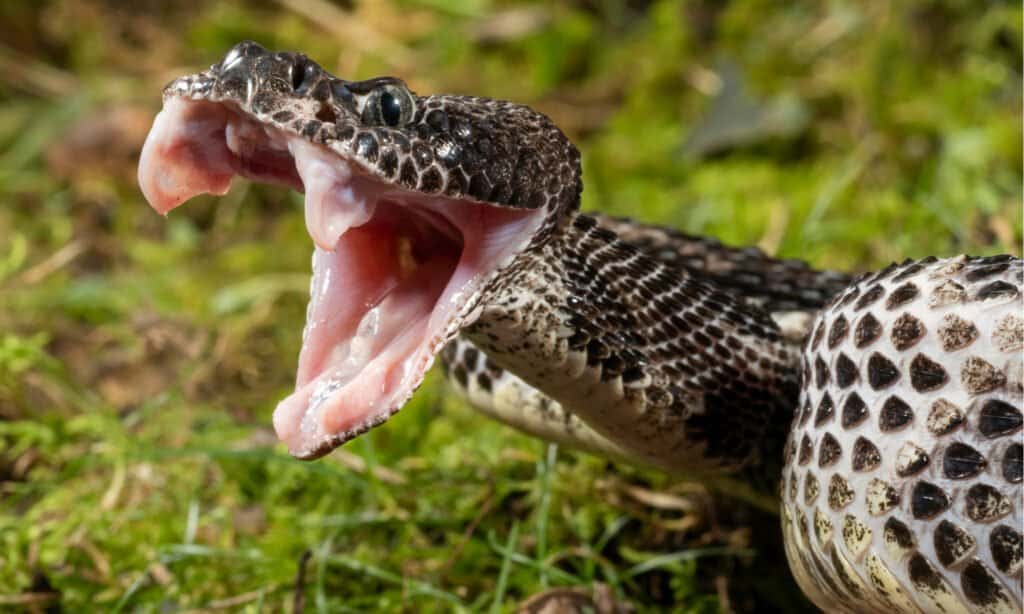
Timber rattlesnakes are one of the largest rattlesnakes, with some getting to be 5 feet long!
©Joe McDonald/Shutterstock.com
Four venomous snakes can be found in Tennessee. Let’s talk about these snakes.
- Copperheads: These snakes live throughout the state. They have dark brown hourglass cross bands with a copper colored head, and are 2-3 feet in length.
- Timber rattlesnakes: These snakes live throughout the state. They have varied coloration, are the largest of the four venomous snakes in the state, and are 3-5 feet in length.
- Pygmy rattlesnakes: These snakes live along the western Highland Rim from Stewart county to the south border. They are gray or tan with rows of black splotches with a tiny rattle, are the smallest of the venomous snakes in the state, and are 1-1.5 feet in length.
- Cottonmouths: These snakes live in the western third of the state, and are sometimes called “water moccasins.” They are dark colored with faint markings. The inside of their mouth is white giving them the “cottonmouth” name, and they are 3-3.5 feet in length.
A news article reported that April is a big month for snake bites in Tennessee as snakes come out of hibernation. It also mentioned that 50% of snake bites are “dry bites,” meaning the snake bites but does not release any venom. The snakes in Tennessee are not some of the most venomous snakes globally, but if you get bit, you should seek medical attention. Antivenom is available in the United States, whereas snake bites can be fatal in some less developed countries. According to the CDC, there is an average of 7,000-8,000 venomous snake bites in the United States each year, with only an average of five of those being fatal.
Two Venomous Spiders In Tennessee:
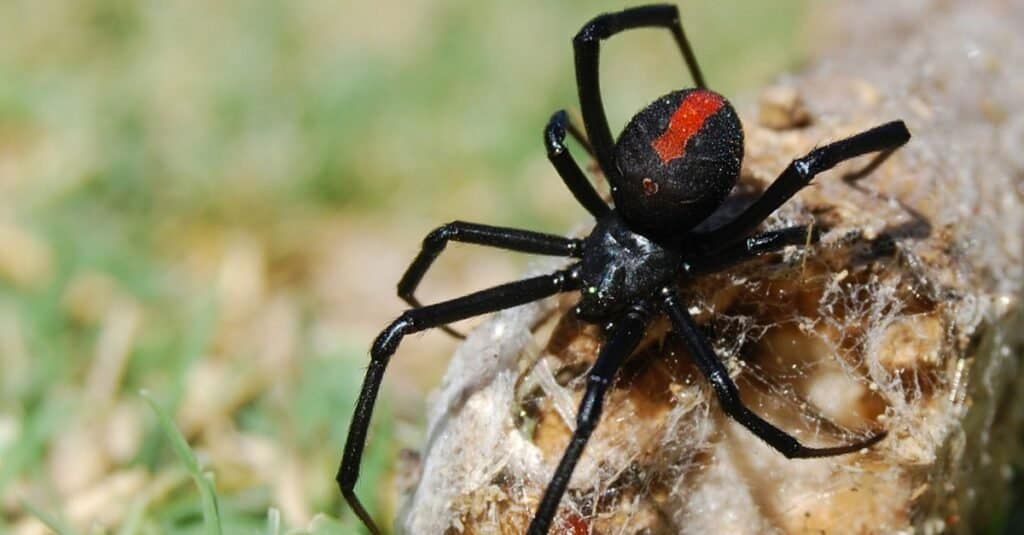
Black widow spiders try to avoid humans, but they can bite and are venomous.
©iStock.com/maria72
- Black widow: Black widow spiders are about a half-inch long (about the size of a dime) and are all black with a red hourglass marking on their back. Their venom can cause nausea, vomiting, muscle weakness, rash, and itching. While most bites are not fatal, it is important to seek medical attention if you think you have been bitten by a black widow.
- Brown recluse: Brown recluse spiders are smaller than black widows and have long skinny legs. They typically keep hidden and prefer to stay away from humans. If you go to grab a piece of wood for a bon fire and accidently surprise one, you could be bitten, and a day or two later you may feel the symptoms which include fever, chills, and nausea. The venom of the brown recluse has properties that eat away at skin cells and tissues so it can leave an ulcer sore. Seeking medical attention is the best cause of action if you think you have been bitten by a brown recluse.
Are There Any Bears In Tennessee?
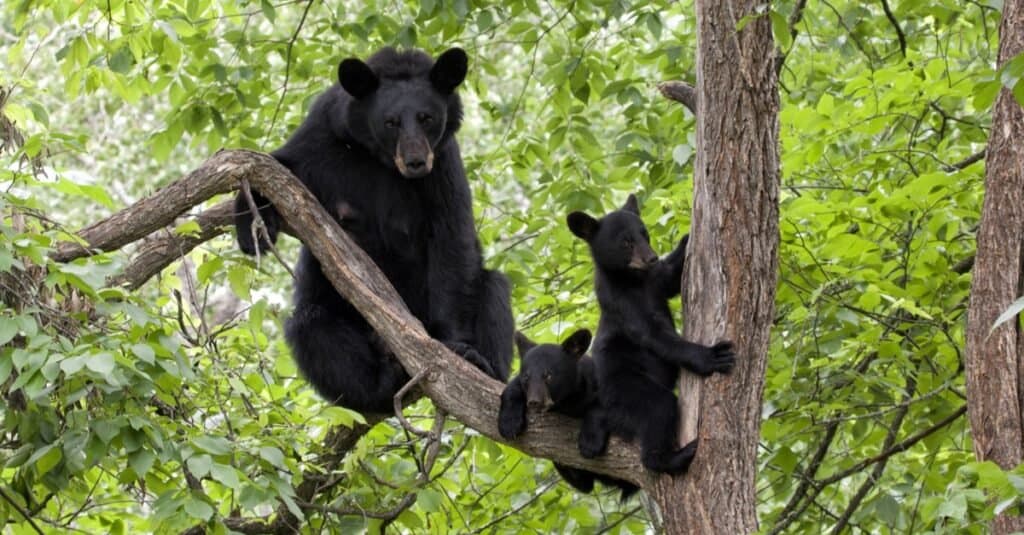
Black bears can be aggressive when there are cubs present.
©Debbie Steinhausser/Shutterstock.com
According to the National Parks Service, “Great Smoky Mountains National Park is one of the largest protected areas in the eastern United States where black bears can live in wild, natural surroundings.” There are an estimated 1,500 bears that live in the park, and although they are not as dangerous as grizzly bears, they can be dangerous. The park’s website advises people never to approach bears and not let bears approach them. Adult males can grow to be 400lbs or more and can be 3 feet tall at the shoulder. Although they typically stay away from humans, there are bear-human conflicts.
An unfortunate incident happened in the Great Smokey Mountains in June 2021 at the Cosby section of the park. A 16-year-old girl was sleeping in a hammock when a bear attacked her. The family was able to chase the bear off, but she received multiple injuries and was taken to a nearby hospital. This incident had officials questioning why this bear attacked since most bear attacks involve a mother bear protecting her young or bears that are approached by off-leash dogs that bark at the bear and then retreat to their owners, bringing an angry bear behind it. The family involved also had all of its food in proper containers, so food was not an issue. Bear attacks are rare, but they happen, and authorities remind people that carrying bear spray is another safety option when hiking or camping in bear country.
Did Elvis Own Any Dangerous Animals And Are There Any Dangerous Animals Still At Graceland?
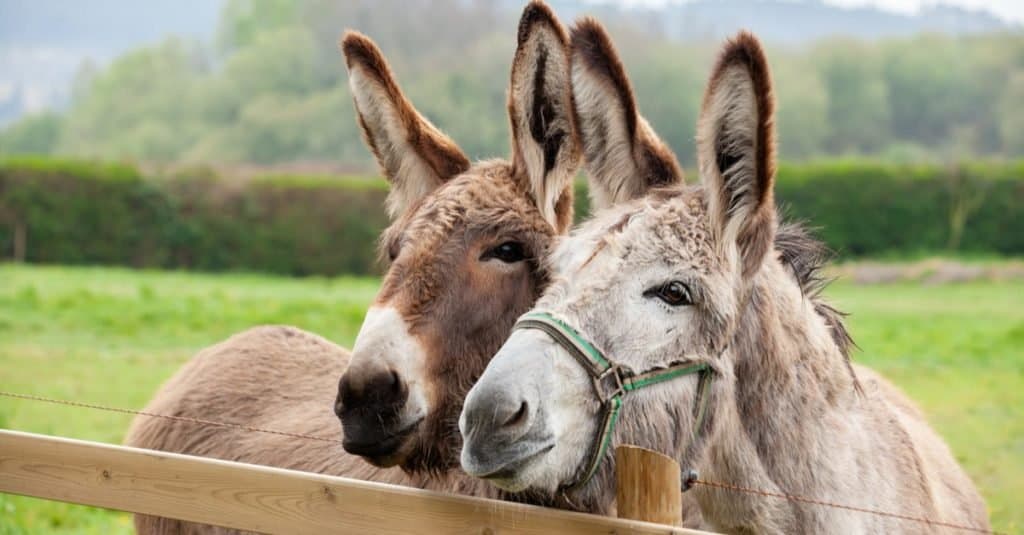
Elvis received a group of donkeys as a gift before the fence was up at his estate, so he kept them in his empty swimming pool.
©vvvita/Shutterstock.com
Graceland, Elvis’ estate, is located in Memphis, Tennessee. Over the years, Elvis had quite a variety of pets and animals. His mother had chickens, and his father raised hogs. Elvis had some traditional pets like dogs, cats, and birds (including a mynah bird that repeated what it heard in the house). He also had some nontraditional pets like a turkey (named Bow Tie), a wallaby, and a chimpanzee (that wore human clothes). He was given some donkeys, but the fence around his property was not complete, so he had to keep them in the empty swimming pool! Farm animals like chickens and hogs can carry diseases as well as turkeys, but most of Elvis’ animals were not dangerous. Today, only horses are left at Graceland, which you can visit if you take the tour.
The photo featured at the top of this post is © Podolnaya Elena/Shutterstock.com
Thank you for reading! Have some feedback for us? Contact the AZ Animals editorial team.






